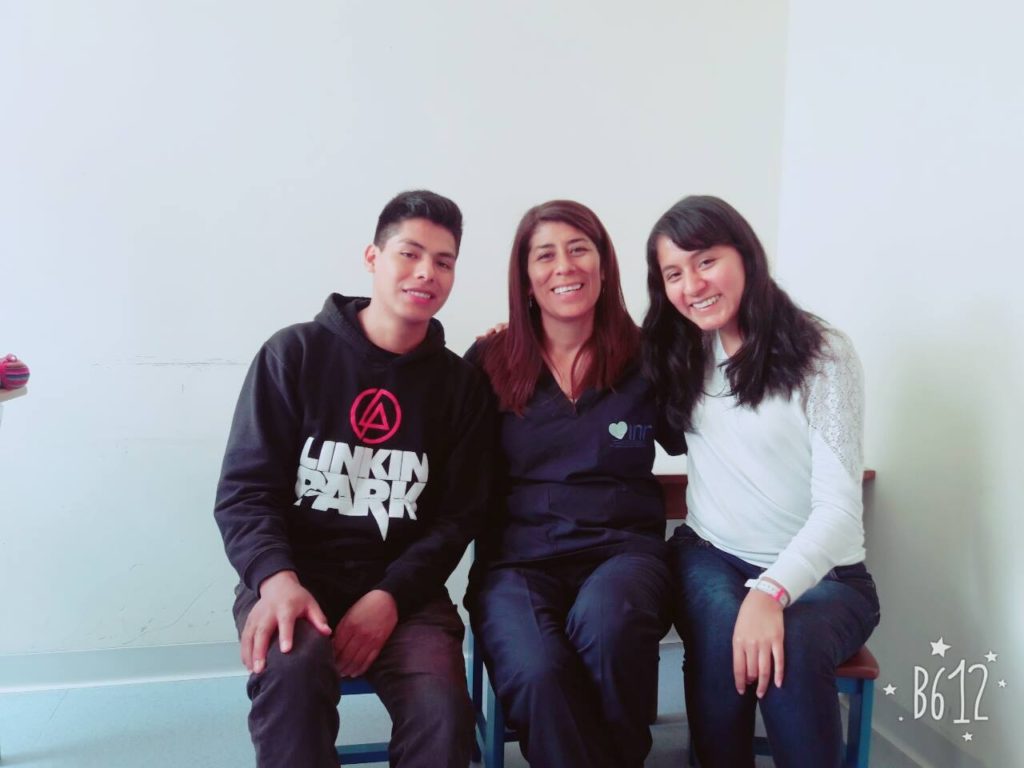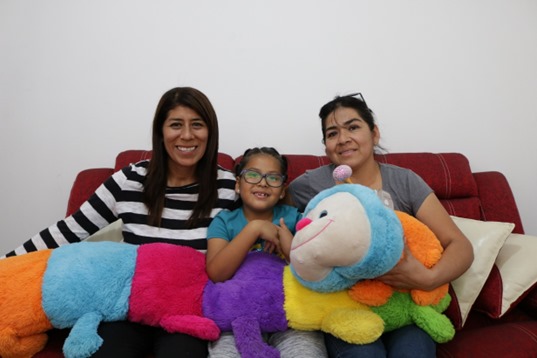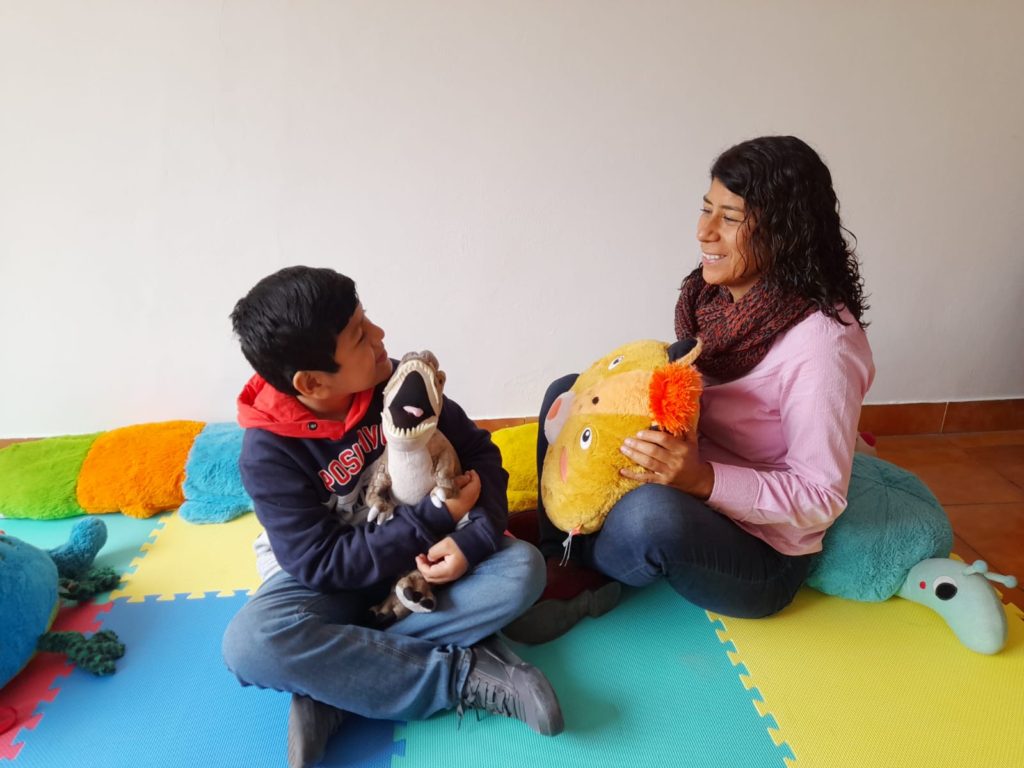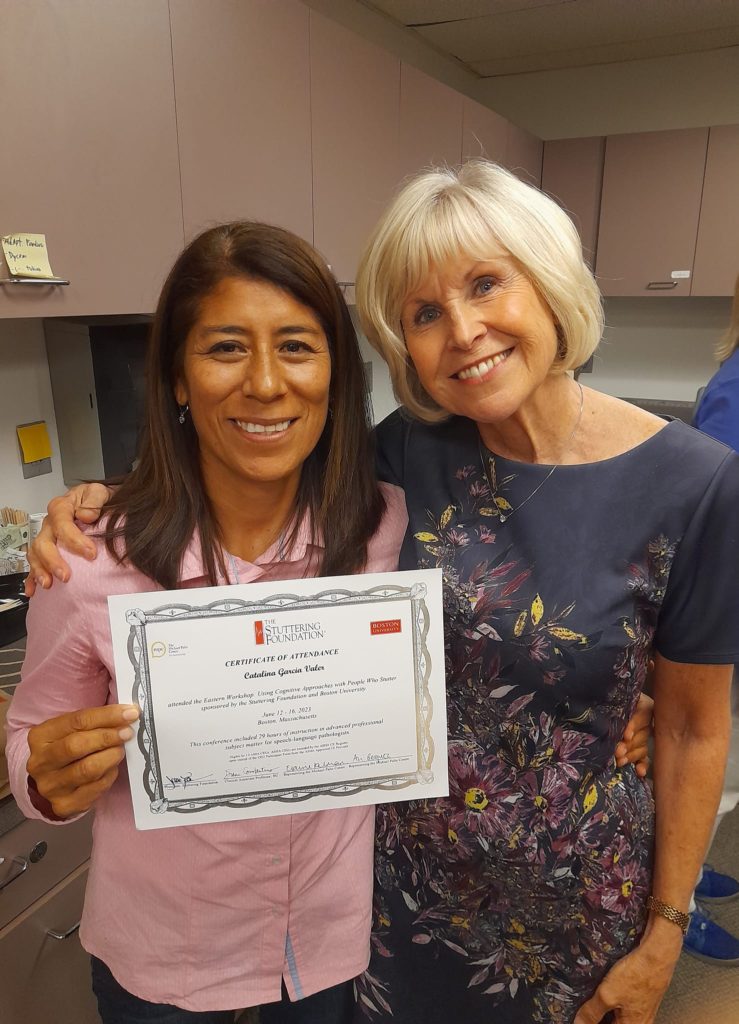|
My name is Catalina Valer García, I am a Speech – Language Pathologist and I live in Lima-Peru. I studied Special Education at the Women’s University of the Sacred Heart in Lima, almost 30 years ago, with the specialty of “Disturbances in Communication”, later I studied a Master’s Degree in Speech Therapy with a mention in Oral Motor, Voice and Stuttering and I have made national and international presentations in relation to Research carried out around Stuttering. |
I practiced my career in different schools and hospitals here in Lima, but I realized that in my work with people who presented Stuttering there was little progress in treatment, so I decided to specialize much more and did a “Specialization in Stuttering and other Fluency Disorders” in 2008.
From that moment there was a change in the approach, since I began to involve the Family and School in the Treatment of Stuttering.
At that time I was working in a state hospital called “National Institute of Rehabilitation” in Lima.
Many people from different cities and provinces of the interior of Perú came to this center. As I listened to each story of young people with stuttering and testimonies of families of children with stuttering, a growing desire grew in me to understand, care for and help them.
Many young people had depression because of stuttering, several of them were studying at university and could not finish their presentations or half of them began to cry.
A young man told me that in his city they called him “mute” because he did not speak because of stuttering; another young woman told me that when she chose her professional career she did it based on a profession where it is not required to speak much due to stuttering; I remember the testimony of a girl who stuttered more when she saw her father consume alcoholic beverages or another child who stuttered more when he heard pyrotechnic sounds.
Each situation and story was unique and different and each of them impacted my feelings and my heart in a very special way. This uniqueness really showed how one size does not fit all.
Thank God I was prepared to attend and guide them since I had specialized in the care of people with Stuttering in Brazil, Argentina and the United States.
My reflection in this space is that if we are professionals who work in the area of Fluency, we need to study and specialize constantly, it is necessary that the Speech Therapist has a scientific and updated training to be able to adequately and timely attend to children, young people, adults and their families.




![]()


Catalina,
You wrote, “My reflection in this space is that if we are professionals who work in the area of Fluency, we need to study and specialize constantly, it is necessary that the Speech Therapist has a scientific and updated training to be able to adequately and timely attend to children, young people, adults and their families.”
The aspiration is highly commendable! But where do you find the materials to study? In SLP schools? Which ones? In books and papers? Which ones?
Do you read up on Cognitive Behavior Therapy? Are any sources better than other?
I am sincerely interested!
Hello, thank you very much for commenting on the post.
About your question, if you want to study a career in Speech Language Pathologist you would need to start by checking the ASHA page to see which universities are accredited under ASHA regulations.
Here I attach the link of the page.
https://apps.asha.org/eweb/ashadynamicpage.aspx?site=ashacms&webcode=caalisting&caacat=slp
In relation to Cognitive Behavioral Therapy, the Michael Palin Center addresing this approach appropriately and scientifically.
I attach the link.
https://michaelpalincentreforstammering.org/
Best Regards
Catalina Valer
Hi Catalina,
The testimonies of children who stutter and families of children who stutter were powerful. It truly shows just how impactful stuttering can be when children are not fully supported and accepted.
You stated that SLPs should be prepared. How do you recommend we prepare to work with a client who stutters? Do you think that all SLPs should be trained or should we have specialized SLPs who focus on stuttering?
Hi thanks for commenting on the post.
I think the first thing we need to have to work with a person who stutters is love, if we love them we can help them and their families. If the SLP wishes to work with people with stuttering they must study a Specialization in Stuttering, not all SLPs must work in stuttering only those who wish to work with people with stuttering because it is required to be patient, in the majority of cases the treatment is not so short. It’s required to be empathetic, maintain calm, tranquility in daily life, know how to listen and guide with scientific knowledge and love.
Best Regards
Catalina Valer
Hi Catalina,
Thank you so much for sharing. The client testimonies and experiences you shared really emphasize that stuttering is phsyically, mentally, and emotionally difficult. There is a greater impact that is not always visible to others. This demonstrates why holistically-focused treatment that focuses on communication, feelings, beliefs, etc. can be so beneficial to people who stutter. You mentioned that to specialize in stuttering, SLPs must study/specialize/learn constantly. Do you have any recommendations or resources for continued education or learning opportunities that you have utilized post-graduation?
Hi, thank you so much for your comment. I studied post graduation in two Workshops from the Stuttering Foundation that were directed to SLP, one of them were directed to work with teenagers and the another one was in June of this year about “Using Cognitive Approaches with people who stutter” in colaboration with the Michael Palin Center. Every year the Stuttering Foundation imparts Workshops to SLP, review their website.
I recommend you to participe in support groups with people who stutter too, look for one of them in your country,it help you a lot to understand different feelings and thoughts of people who stutter.
Greetings
Katty Valer
Hi Catalina,
Thank you for your wonderful insights and personal experiences. I am in my final year of graduate school and I have been looking for different perspectives on specializing withing the field of speech language pathology. You mentioned that you have specialized in the care of people who stutter over the years. Would you recommend generalizing in any other areas of SLP to support the path to specialization?
Hi, thank you so much for your comment and congratulations on being in your last year of graduation school. In my personal experience I decided to work with people who stutter, however there´re another area that is so interesting and useful and I love it too but I need to learn more about it, this´s voice disorders.
I´ve found relation in many cases of stuttering with voice disorders, specifically due to the tension at the level of the larynx, etc. But it´s important consider in what way or area you feel happy and you enjoy your job.
Best regards
Catalina Valer
Catalina,
When reading your contribution I thought about all the internal turmoil a person who stutters must have. You met so many different people during your career, and I can tell you are passionate about helping them. For a young man to be called “mute” because he did not want to speak because of stuttering, and a girl choosing a career based on not having to talk tells the story of how hurtful people’s actions toward those who stutter can be. Al I could think of is hurtful, hurtful, hurtful. Any way an SLP can help free a person who stutters from their burden would be rewarding.
Hi my dear friend, than you for your valuable comment. It was one of the reasons that I decided write and publish my reflection on this date because the SLP MUST to be prepared scientifically to attend responsibly people who stutter because in the majority of cases it causes pain, anguish and suffering.
Warm regards
Catalina Valer
Hi Katty. I have a lot of thank you’s for you.
Thank you for specializing in stuttering. We need more SLP to do so, to dig deeper than only touching the surface of stuttering and the stuttering client.
Thank you for involving families and schools in treatment. I’ve been preaching for years to involve others in therapy. As stuttering is something that involves also the listener, the parents, teachers, employers, friends etc. Why not have a bestie to a CWS joining, so that they together can do the assignments, find support and have a good laugh together.
And thank you for listening. As this year’s theme is not just taken out of thin air. Listening, asking questions, as stuttering is not only something that’s in the mouth, but also in the heart. We carry a lot of background and experience with us as well.
Having been a camp leader for YPWS for many years, I’ve heard so many stories, dried and cried so many tears. When for many the only “therapy” they ever needed was for someone to listen and tell them they are OK, just the way they are.
There are also so many quacks who offer a quick fix, and when it doesn’t work (duh…) it’s the client’s fault, having lost a lot of money and self-esteem.
I hope all SLPs read your paper.
Happy ISAD and keep talking
Anita
Hi Anita, thank you so much for your comnent. I appreciate you so much. It´s so interesting that you said “Stuttering is not only something that´s in the mouth, but also in the heart” You know, one of the powerful reasosns that I decide to write and participate in the online conference is because in my country unfortunately there´re people who attend people who stuther without being specialized professionals, they only study for few months, they don´t have the knowledge and the experience to work properly. This´s so hard and I feel worried for that, I think people who stutter should know and find out the work experience of the person who assists them so that they are not deceived.
I think we should warm PWS about this because as stuttering spreads, more people will appear who will want to take advantage of this need.
For another side thank you to encourage me to continue talking and teaching about stuttering. I´ll do that.
Love you Anita, thank you so much again, happy ISAD.
Catalina Valer
Hi, Catlina! As a future SLP, I really appreciate your insights and outlook on PWS. It’s so important to consider that each client we meet will have their own unique experience with stuttering, and we need to get to them as a person and honor what makes them unique in order to provide the best treatment.
Hi, thank you for your comment. Sure every person, every child, every ypung anf family is unique; we need to listen them, what worries them, what makes them sadm happy, strong, how they like to learn trying to find the way how can help them, the treatment in stuttering is not a recipe is a process.
Best regards
Catalina Valer
Hi Catilina,
I just wanted to tell you that your post meant the world to me. As someone who grew up with a mild stutter, I was not bullied for my stutter, but I was heavily picked on by my friends. These were innocent remarks that I know were for laughs, but they cut deep into me and left me speechless. Although I was able to control my stutter growing up, my brother received speech therapy from an SLP who became a family friend. She is the reason I am involved in this field and, while reading your post, she immediately came to my mind. People like you and her are constantly changing the lives of children and adults around the world. Thank you for everything you’ve done.
Matthew
Hi dear Matthew thaks for commenting on this post.
I want to tell you that look inside you, look inside yourself what your gifts and talents are, life is more than stuttering, there are a lot of people that need you, need of your words, of your ideas, of your hands, of your heart, of your experience; I am sure there are already you a lot of kids, teenagers, families that need you because all of that are in the world with a good purpose, all of us are valuable, for some reason God permit us to know and encourage each other. God bless you all time and use your life to encourage to other people. A big hug.
Catalina Valer